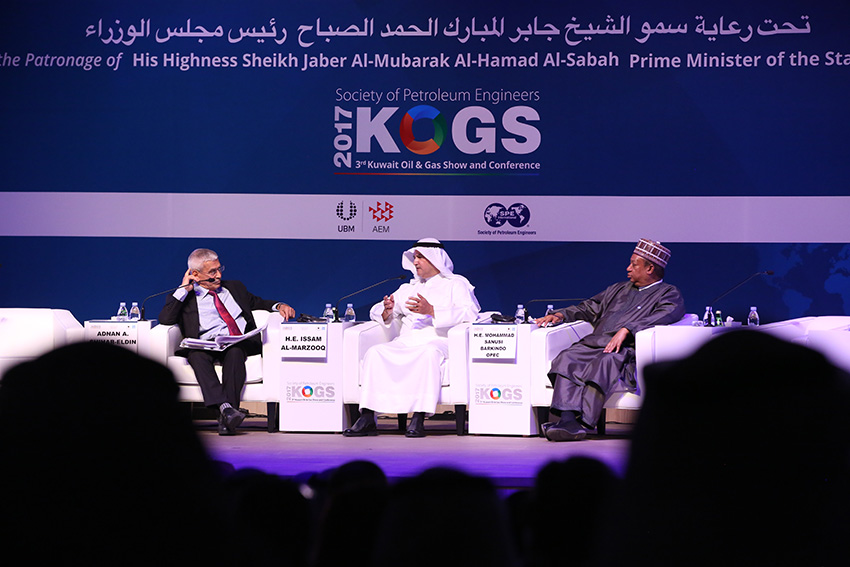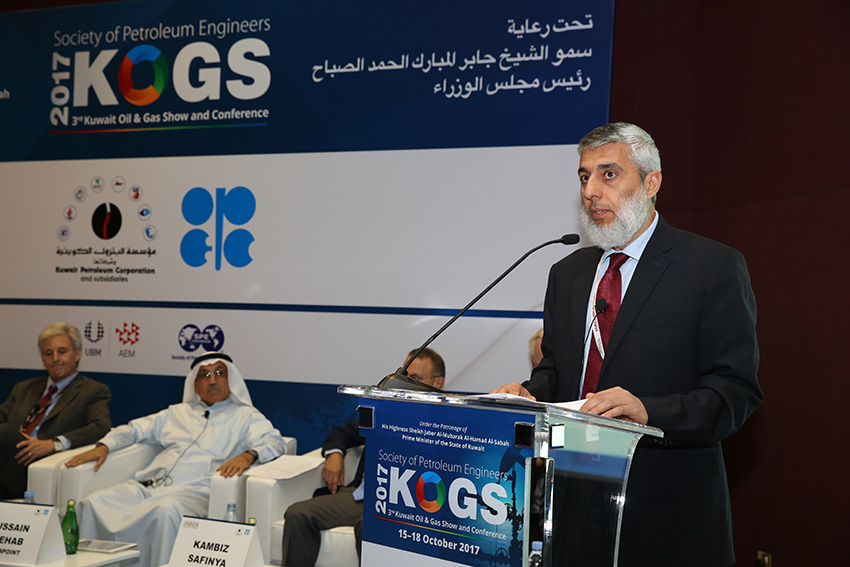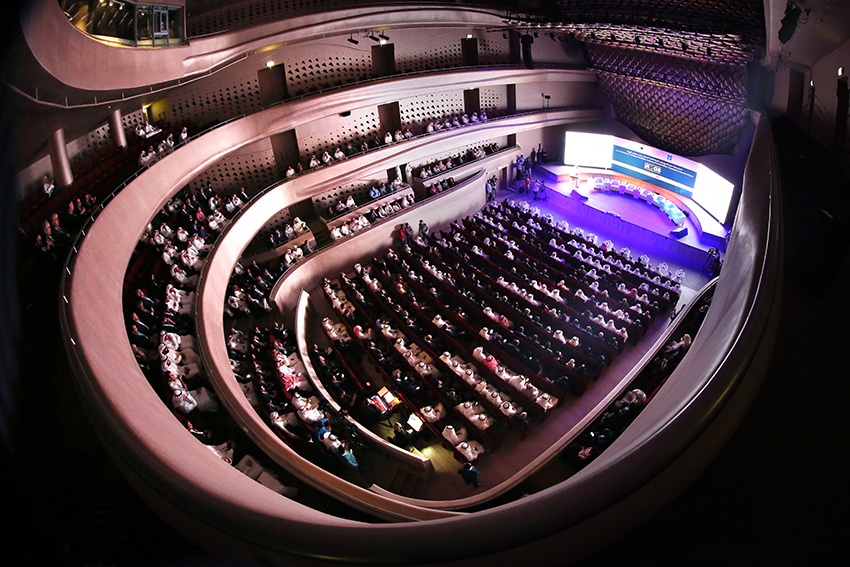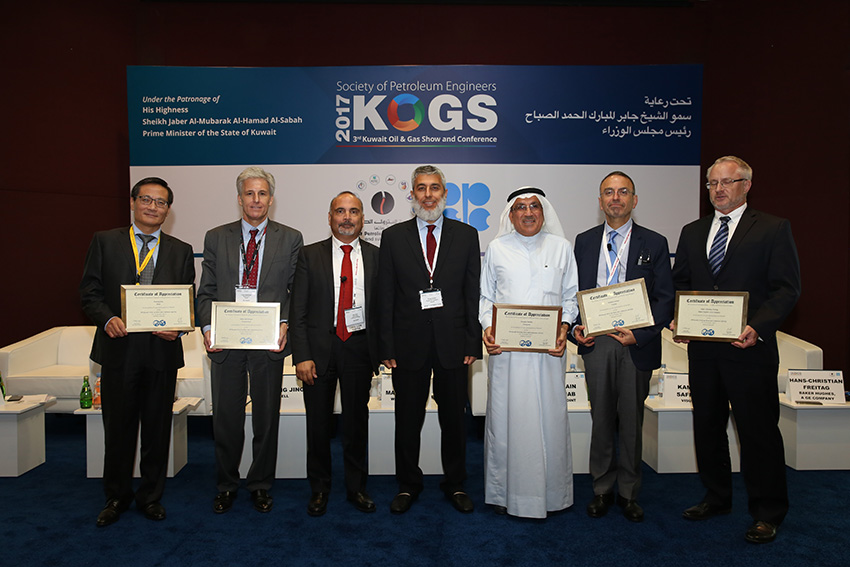KOGS 2017 …. A story of success
Once again Kuwait is proving to be an important figure in the global oil equation, as in the third edition of Kuwait Oil & Gas Exhibition (KOGS 2017), Kuwait had a strong present because it occupies a middle and distinct position in the Gulf region, which qualifies it to play many important roles on every level.
This time, the importance of the conference and exhibition, which is hosted by Kuwait every two years, is increasing, as it is a meeting place for all parties involved in the production, refining and marketing of oil, and with it Kuwait also records a new success story, adding to previous stories, both in terms of attendance and participation, Seminars and workshops organized, in addition to attracting many international companies working in the field of oil and gas, which offered the latest technologies and products.
The conference, held every two years and organized by the Society of Petroleum Engineers International in cooperation with KPC and its subsidiaries, was held under the patronage of His Highness the Prime Minister of Kuwait Sheikh Jaber Al Mubarak Al Hamad Al Sabah. The conference was held this year under the slogan "Shaping the future of Oil: integration and diversification".
Opening Ceremony
The Conference's opening ceremony was attended by a large and distinguished presence. Besides Oil Minister Essam Al-Marzouq who represented the Conference's sponsor, the list of attendees included OPEC Secretary-General Mohammed Barkando, KPC Chief Executive Officer Nizar Al-Adasani, Chief Executive Officer of Kuwait Oil Company Jamal Abdul Aziz Jaffar, President of the International Petroleum Society Sami Al Naim, as well as a number of ambassadors and executives of the K companies and other local, regional and global companies, as well as a crowd of invited guests who drowned the theater at Jaber Al Ahmad Cultural Centre in Kuwait the Capital.
.JPG)
.JPG)
A promising future and… challenges
In the opening speech, Oil Minister and Minister of Electricity and Water Issam Al-Marzouq expressed his optimism about the future of demand on energy, saying that the latest OPEC forecasts indicate a 35% increase in energy demand in 2040 compared to 2015. The Minister said that it is expected that Fossil fuel remains a key source of meeting energy demand at 75 percent by 2040 compared to 81 percent in 2015.
In parallel, the share of renewable energy sources from wind, photovoltaic, solar and geothermal energy will rise from 1 percent in 2015 to 5 percent in 2040, while the share of nuclear power in the same period will rise from 5 to only 6 percent, he said.
However, the Minister pointed out to a number of challenges faced by all in light of the weak prices of crude and with the governments of producing countries tending to carry out economic and financial reforms in order to diversify sources of income, in addition to competition and the need to raise the efficiency of energy use through advanced technology and the need to consider the environment in various activities of the oil and gas industry.

Ambitious plansAl-Marzouq stressed that Kuwait is continuing its expansion plans and investments in the oil field in order to implement vital projects in accordance with the 2040 strategy, regardless of oil prices. These projects include the continuation of oil and gas exploration and refining in order to turn it into high value products.
He added that this means expanding the production of petroleum products, which enhances the environmental performance and safety in the refineries, and provides job opportunities for Kuwaitis and support the growth in the country.
He indicated that a number of initiatives and joint workshops will be launched within the framework of the implementation of the strategic program for local content through partnerships with the private sector to support the local economy in order to develop the sector by allowing it to become an active partner in development, and determine the services needed by the oil sector in the future.
 Integration and diversification
Integration and diversificationIn his speech, KPC Chief Executive Officer Nizar Al-Adsani explained that KPC strategy until 2040 was built on the basis of integration and diversification, thus enhancing Kuwait's role in meeting the needs of the global market and keeping abreast of developments in the world of oil industry.
Al-Adsani pointed to a number of variables that cast a shadow over supply and demand and therefore on prices, saying prices were in the orbit of $50 a barrel.
He indicated that the transport sector is witnessing a qualitative leap that will soon be a challenge to the demand for oil after the fall of the prices of electric cars due to the technological development in the industry, with some countries tending to provide incentives to use them and encourage their spread. He expected that the share of electric cars in the world market will be at 6% in 2040 Compared to 0.7 percent in 2017.
He pointed out that the legislations that some countries have started to adopt in accordance with the international agreements to reduce emissions and maintain a clean environment, require oil producers to devise strategies to provide the markets with a clean card that conforms to these legislations. He pointed out that KPC and its subsidiaries will increase production capacity to 4 million barrels per Day by 2020, and one billion cubic feet of free gas in 2023.

Projects and partnerships
Al-Adsani said that the increase in production capacity will be through the implementation of various projects, including the construction of three units for early production to raise the capacity of free gas, with the last one to be launched in January, and then the production of free Gas in Kuwait, which will reach 500 million cubic feet per day.
He pointed out that 2 Gathering Centers will be inaugurated in March 2018 in northern Kuwait, as well as the development of the lower Fares reservoir in the Ratqa field for the production of heavy oil, noting that the production of heavy oil in these reservoirs will be about 60 thousand barrels per day.
Petrochemical Priority
Al-Adsani stressed on the keenness of KPC to develop the Petrochemical sector, which is now one of the main pillars of diversification of sources of income. He stressed that Kuwait is proceeding with preliminary engineering studies for the construction of a complex of olefins and aromatics in cooperation with Al-Zour refinery, Indicating that this stems from KPC’s belief in the importance of integration between the refining and petrochemical sectors.
He added that KPC is keen to strengthen its presence on the international level, with the most prominent example is the construction of a petrochemical complex in the United States in collaboration with "Dow Chemical", which is now in its final stages of implementation, while operations are planned to start in 2020.
He explained that studies are underway on the construction of a joint compound for aromatics in Bahrain, in partnership with the National Oil and Gas Authority, in addition to the establishment of a petrochemical project in the state of Alberta in Canada, while KPC is working to build eight tankers to transport crude oil, liquefied petroleum and petroleum derivatives.
 A promising future
A promising futureThe last speech of the opening ceremony was given by Sami Al Nuaim, President of the International Petroleum Engineers Association, who works for Saudi Aramco. He thanked Kuwait and its people for giving him the opportunity to speak for the first time as President of the Society.
Al-Naim confirmed that the Middle East currently accounts for more than 55 percent of the world's oil reserves, while the members of the region account for 70 percent of the members of the Society of Petroleum Engineers.
"Energy supply will be the most important source for the transport sector in the foreseeable future," he said. "The world will continue to develop oil resources as well as petroleum industries”.
However, he acknowledged on the other hand that the oil and gas industry will face technological and logistical challenges in light of fluctuating prices. Therefore, producers must prepare to interact with these challenges in order to help the oil industry to develop new and sophisticated technologies and seek to transfer technical knowledge.
He emphasized that ESP has many programs that can help to achieve more health, safety and environmental outcomes, and hopes that they will be utilized.
.JPG)
Challenges ... Challenges
The Director General of the Kuwait Foundation for the Advancement of Sciences (KFAS) Adnan Shihabuddin moderated the executive discussion panel between Minister Al-Marzouq and OPEC Secretary-General Mohamed Barkando on the situation of oil market and the challenges faced by the oil and gas industry, as well as the best way to shape the future of energy. Al-Marzouq pointed to the situation in the oil market and its future prospects in light of falling prices because of the large surplus, adding that the agreements made by the producer countries within and outside of OPEC, resulted in a decline in stocks and improved prices.
According to Al-Marzouq, long-term prospects indicate that demand for oil is increasing despite technological developments in the transport sector.
The two interlocutors agreed on the need to keep abreast of technological developments in the oil sector and improve performance in order to maintain a clean environment by applying strict standards in oil operations.
Frame 1 – Al-Marzouq: We will return to production from Khafji soon
The second day of the third oil and gas exhibition and conference was held in the presence of Oil Minister, Minister of Electricity and Water Issam Al-Marzouq, Chief Executive Officer of Kuwait Petroleum Corporation Nizar Al-Adsani and several senior officials of the Kuwaiti oil sector.
In response to journalists' questions after his tour at the exhibition, Minister Al-Marzouq said that the Bio Fuel project at Mina Abdulla refinery and Mina Al Ahmadi is one of the most important projects implemented by the oil sector in Kuwait, stressing that it is nearing completion, while work at Al-Zour is in full swing and it is hoped to be completed by the end of 2019.
For KOC projects, the Minister said it ranges from drilling new wells to establishing gathering centers, as well as early production centers for oil and gas.
On his vision of the reduction of production reached between the producers to restore the oil market balance, the Minister said he was happy with the large commitment that has been achieved since January to last September, and expressed the hope that the signatory countries will continue to abide by the new agreement, which ends in March 2018. He indicated that in November, the numbers and results of the first four months of the extension agreement will be examined, with the aim of issuing recommendations to the OPEC Ministerial Conference scheduled for November on any possible future extension.
The Minister pointed to the situation in the field of Khafji, saying that Kuwait is still in talks with the brothers in Saudi Arabia, and there are simple things on the way to a solution, "God willing, we will return production from the field."
Frame 2 - numbers from the conference
- 628 working papers were received from 153 companies
- 143 papers were selected for presentation through 21 technical sessions
- One Ministerial meeting was held after the opening of the Conference
- One plenary session was held
- Four discussion sessions were held during the conference
- Seven special sessions were held
- The number of companies attending the exhibition exceeded 200 companies
- Number of participating countries reached 20
- The exhibition area amounted to 14 thousand square meters